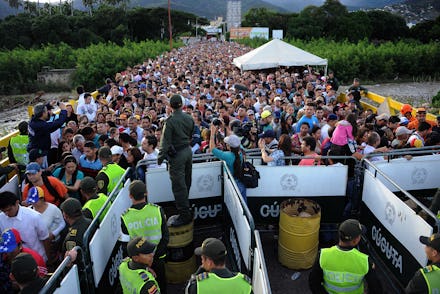Venezuela Food Crisis: One Photo Shows the Strain on Venezuela's Economy in 2016

Oil money has helped lift millions out of poverty, but it's an unstable foundation for an economy, as the dire financial crisis in Venezuela has illustrated.
On Saturday and Sunday, shortages got so bad that the government reopened its border with neighboring Colombia to allow Venezuelans to cross over and buy medical supplies and food, Reuters reported.
Taking advantage of the reprieve, officials estimated at least 100,000 people crossed the border over the course of the weekend, the BBC reported — pushing bus terminals and hotels to capacity, according to Reuters.
To understand how Venezuela got to this point, you have to go back to 1999 when President Hugo Chávez came to power. A new constitution passed under his watch lowered poverty in the short and medium term, mainly by nationalizing oil fields and using the money to improve social services.
Over the first half of the last decade, the quality of life for Venezuelans improved at the third-fastest rate globally, with poverty falling by almost half.
Then oil prices collapsed.
Without strong oil revenues to help fund the government, Venezuela had little choice but to begin printing lots of money. Inflation — when money gets less valuable and people lose buying power — quickly got out of control, and is projected to top 400% this year and 1,640% in 2017, the Wall Street Journal reported, citing the International Monetary Fund.
Hyperinflation, when inflation gets that high, happens when people stop trusting their currency. Paper money only has value because people believe it has value. If they lose faith in the currency, they spend it as fast as they can, stocking up on goods they're worried they won't be able to afford tomorrow.
This drives shortages, which have gotten so bad in Venezuela that the government basically handed all the food over to the military to ration out.
And when food is in such short supply, many suffer.
Unfortunately, Venezuela has a historically tense relationship with the U.S. and institutions like the International Monetary Fund, which otherwise might be willing to float it an emergency loan. So without radical changes to its constitution — or an enormous spike in oil prices — weekend trips to Colombia may remain the norm for Venezuelan consumers.
Read more: